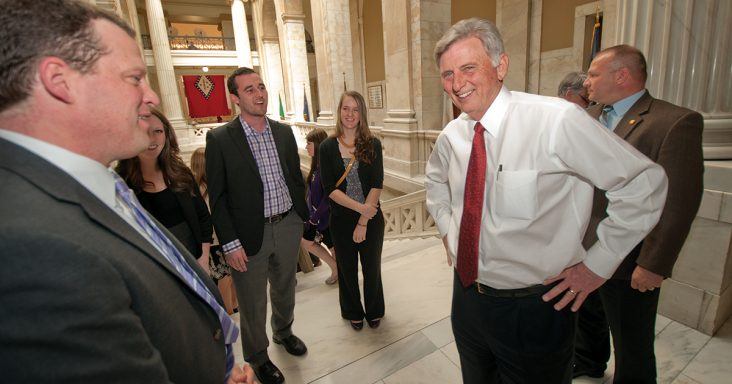Top 5 Arkansas political stories of the decade
by February 18, 2020 12:27 pm 3,020 views

(right) former Arkansas Gov. Mike Beebe
At the beginning of the decade one could be a Democrat in Arkansas and stand a good chance of winning a statewide office or Congressional seat. At the end of the decade, well, not so much.
And while Republicans met with much success during the decade, a majority of legislators caught up in fraud, campaign violations and other serious ethical breaches would be Republicans. Following are what we thought were the top five political events and stories of the decade.
1: 2014 political shift moves GOP to control Legislature, Constitutional and Congressional offices
Led by resounding victories at the top of the ticket, Republicans made unprecedented gains at the federal, state and local levels beginning in November 2014. The GOP not only held onto those gains, but would solidify political positions down the ballot.
Republicans easily won all four congressional seats, giving them control of all of the federal offices in Arkansas. The GOP gains filtered down-ballot with Republicans taking commanding control of the state house. Republicans increased their margins in the 100-member House of Representatives from 51 seats to 64 seats, and in the 35-member state Senate from 22 to 24 seats, capped off by then-U.S. Rep. Tom Cotton trouncing incumbent U.S. Sen. Mark Pryor.
They also won all of the remaining constitutional offices — including lieutenant governor, attorney general, secretary of state, auditor, treasurer and commissioner of state lands — giving Republicans the title of “majority party,” which includes controlling local election commissions in all 75 counties.
2: New national healthcare law begins implementation in 2010; in Arkansas it begins as the ‘Private Option’ and morphs into Arkansas Works
Originally known as the “private option,” Arkansas Works was created by legislators and Gov. Mike Beebe’s administration in 2013. It was created after the U.S. Supreme Court ruled states could choose whether to expand their Medicaid populations under the Affordable Care Act, otherwise known as Obamacare.
Many Republican-leaning states chose not to expand their populations. Arkansas did, but instead of simply expanding Medicaid, it used mostly federal funds to purchase private health insurance for those lower-income individuals.
In the 2015 and 2017 legislative sessions, Gov. Hutchinson transformed the “private option” Medicaid expansion program started under Democratic Gov. Mike Beebe and GOP state lawmakers into Arkansas Works. The work requirement, which received a federal waiver late last year, led to conservative buy-in to continue the program in the 2017 session.
3: Gov. Mike Beebe steps off the political stage
After more than three decades on the political scene, 2014 was the backdrop for Mike Beebe’s farewell tour. The two-term Governor completed his last full year in office and retired to his hometown of Searcy with no plans to re-enter politics.
Beebe, who left office with a high approval rating after eight years as Arkansas Governor, also served one term as Attorney General and more than two decades in the state Senate. Beebe said he hoped to be remembered for two accomplishments. One was the Payment Reform Initiative that he sees as bending the cost curve on healthcare costs through an episodic care model versus a fee-for-service model. He also said he wanted Arkansas to have a higher self-esteem through his leadership — a “swagger” that would reflect a can-do mindset for the state.
“Not a negative Texas one (swagger), but a good positive one,” Beebe said.
4: Rise of Trumpism, not only nationwide, but in Arkansas; impeachment
Republican Donald Trump’s victory in the 2016 Presidential election was one of the biggest political earthquakes of the decade. After dispatching a crowded GOP field, Trump defeated Democrat — and former Arkansas First Lady — Hillary Clinton in one of the biggest upsets in modern political history.
In October 2018, 63% of Arkansans approved of President Trump’s job performance according to a Talk Business & Politics-Hendrix College poll. The poll showed 34% who disapproved of his performance.
The Arkansas Poll, managed by the University of Arkansas, found that President Trump’s approval rating was 50% among Arkansans surveyed, up from 47% in 2017. His disapproval rating was 45% in 2019, also up from 40% in 2017. That poll was published Nov. 6, 2019.
The U.S. House of Representatives would impeach President Trump in late 2019, with acquittal coming from the U.S. Senate in early 2020. It was only the third time in U.S. history that a U.S. president was impeached.
5: Political scandals in the Arkansas Legislature
Legislators from the Republican and Democratic parties on Feb. 4, 2019, announced a gaggle of measures they hoped to enact into state law to bolster ethics reform at the State Capitol.
Members of the legislature caught up during the decade in some form of fraud related to the spending of state tax dollars or other fraudulent schemes included Sen. Gilbert Baker, R-Conway; Sen. Paul Bookout, D-Jonesboro; Sen. Jon Woods, R-Springdale; Sen. Jake Files, R-Fort Smith; Sen. Jeremy Hutchinson, R-Little Rock; Rep. Micah Neal, R-Springdale; Rep. Eddie Wayne Cooper, D-Melbourne; and Rep. Henry “Hank” Wilkins, D-Pine Bluff.
Editor’s note: This article first appeared in Talk Business & Politics annual State of the State magazine.
